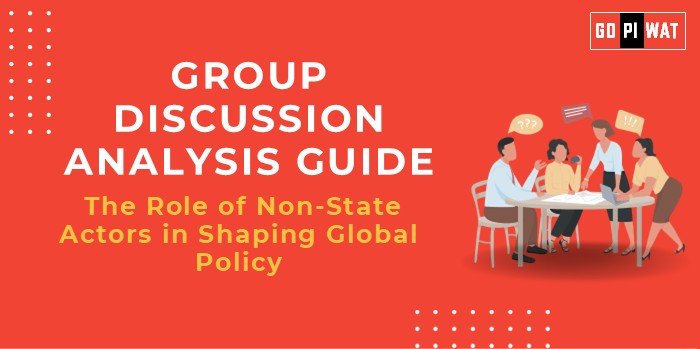📋 Group Discussion Analysis Guide: The Role of Non-State Actors in Shaping Global Policy
🌐 Introduction to the Topic
📖 Opening Context
Non-state actors (NSAs)—ranging from multinational corporations and non-governmental organizations to international advocacy groups and terrorist organizations—play an increasingly pivotal role in influencing global policies. Their impact extends across economic, social, environmental, and security domains, often filling gaps where state actors are ineffective.
📜 Topic Background
The concept of non-state actors gained prominence post-Cold War as globalization and technological advancements empowered entities outside traditional state mechanisms. For instance, entities like Greenpeace advocate for environmental policies, while corporations like Google influence global data regulations.
📊 Quick Facts and Key Statistics
- 🏢 MNC Revenue Influence: Apple Inc.’s 2023 revenue ($394 billion) surpasses GDPs of many nations, showcasing economic leverage.
- 🌍 Global Advocacy Impact: NGOs like Amnesty International operate in over 150 countries, affecting human rights policies.
- ⚠️ Terrorism Costs: Global economic losses from terrorism were estimated at $49 billion in 2023 (Global Peace Index).
- 🌱 Carbon Neutral Commitments: 1,800+ companies committed to net-zero emissions by 2050 (UN Global Compact, 2023).
🤝 Stakeholders and Their Roles
- 🏢 Multinational Corporations (MNCs): Shape economic policies through investments, lobbying, and international trade.
- 🌍 NGOs and Advocacy Groups: Drive social change, influence treaties, and hold governments accountable.
- ⚔️ Terrorist Groups: Destabilize regions, impacting international security frameworks.
- 🗣️ Global Public Opinion: Mobilizes governments and organizations to act on pressing global issues.
🏆 Achievements and Challenges
✨ Achievements
- 🌱 Climate Action Advocacy: NGOs like WWF influenced the Paris Agreement.
- 💼 Economic Policy Influence: MNCs shaped trade agreements like USMCA.
- 🩺 Global Health Initiatives: Gates Foundation contributed $2.1 billion to fight malaria.
⚠️ Challenges
- 🔓 Unregulated Power: Social media giants face criticism for data misuse.
- ⚖️ Conflict of Interests: Corporate lobbying often skews policies.
🌍 Global Comparisons
- ✅ Success: Sweden’s engagement with NGOs ensures comprehensive refugee policies.
- ❌ Failure: Poor regulation of Facebook led to misinformation crises globally.
📖 Case Studies
- 🌟 Positive: Greta Thunberg’s Fridays for Future compelled nations to revisit climate commitments.
- ⚡ Negative: WikiLeaks disclosures disrupted diplomatic relations.
💡 Structured Arguments for Discussion
- 🛠️ Supporting Stance: “NSAs complement state efforts by driving innovation and ensuring accountability.”
- 🛡️ Opposing Stance: “Unchecked NSA activities can undermine sovereignty and prioritize profits over people.”
- ⚖️ Balanced Perspective: “While NSAs fill critical gaps, regulatory oversight is essential to align their goals with public interest.”
🎯 Effective Discussion Approaches
🔑 Opening Approaches
- 📜 Quote: “In the 21st century, power no longer resides solely in state hands.”
- 📊 Statistic: “MNCs control over 60% of global trade.”
⚙️ Counter-Argument Handling
- 🔄 Acknowledge: “Yes, NSAs have positive roles, but…”
- ➡️ Redirect: “To prevent misuse, frameworks like the UN Guiding Principles are critical.”
🧠 Strategic Analysis of Strengths and Weaknesses
SWOT Analysis:
- 💪 Strengths: Global reach, innovation, and public influence.
- 🛠️ Weaknesses: Accountability issues, profit motives.
- 🌟 Opportunities: Collaboration in sustainability, digital governance.
- ⚠️ Threats: Power imbalance, regulatory loopholes.
🏫 Connecting with B-School Applications
📚 Real-World Applications
- 🌍 Exploring NSA roles in financial inclusion (e.g., PayPal’s initiatives).
- ♻️ Assessing policy frameworks in sustainability.
🎓 Sample Interview Questions
- ❓ “How can NSAs address global inequality effectively?”
- ❓ “What lessons can be drawn from corporate lobbying cases?”
💡 Insights for B-School Students
- 📈 Leverage NSA projects for sustainable innovation.
- ⚖️ Study ethical challenges in lobbying and advocacy.


